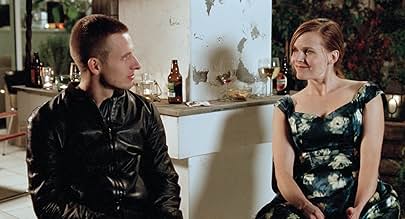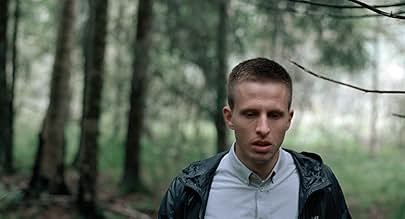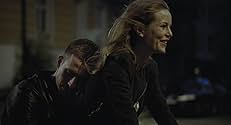अपनी भाषा में प्लॉट जोड़ेंOne day in the life of Anders, a young recovering drug addict, who takes a brief leave from his treatment center to interview for a job and catch up with old friends in Oslo.One day in the life of Anders, a young recovering drug addict, who takes a brief leave from his treatment center to interview for a job and catch up with old friends in Oslo.One day in the life of Anders, a young recovering drug addict, who takes a brief leave from his treatment center to interview for a job and catch up with old friends in Oslo.
- निर्देशक
- लेखक
- स्टार
- पुरस्कार
- 19 जीत और कुल 21 नामांकन
Aksel Thanke
- Terapeut
- (as Aksel M. Thanke)
Tone Beate Mostraum
- Tove
- (as Tone B. Mostraum)
फ़ीचर्ड समीक्षाएं
The sober rationality of the young Norwegian intellectual classes provides a perfectly blank canvas on which to paint the conversely complex neuroses of the anti-hero, Anders. Anders is an intelligent and gifted opinionist and writer, but his addiction has left him riddled with insecurity. The film focuses on the most pivotal moment of this young man's life as he's tragically stuck between recovery and regression: that moment is both sprinkled with glimmers of hope and drenched in melancholia. Anders' contradiction is the eternal paradox of the addict, and perhaps Trier is presenting it as an allegory of the modern human condition. Anders Danielsen Lie gives an incredible performance as the enigmatic hero and the acting throughout is consistently authentic, convincing and engrossing. The soft-focus cinematography (Jakob Ihre) works well with a particularly engaging sound design which, along with very conscious direction, editing and general production design, makes for technically masterful cinema with an aesthetic that is both selectively minimal and enjoyably rich. Oslo is a tragedy. Its simple, melancholic tone and metropolitan landscapes make the film undeniably reminiscent of the French New Wave - think Hiroshima Mon Amour in present day Oslo. The film is minimal and stylized, presenting social realism in an artistic form without losing any of its dramatic potency to surrealism. Utterly convincing and captivating: an instant indie classic.
The opening and closing minutes of Oslo, August 31rst are peerless filmmaking, a simultaneously nostalgic and disturbing slideshow of images from the titular city, which appears as some kind of larger supernatural entity with a will of its own. The film that they bracket is pretty decent too. It's a quiet slice of cinema verite about Anders, a recovering drug addict.
This isn't your standard AA-approved narrative of redemption, and that's what makes it good. Anders discovers that the world outside is frosty, ambivalent towards him, and most of all banal and meaningless. Of course, the difficulty is portraying banality without being banal yourself, and Trier doesn't entirely succeed here. But it does provide, on top of the more philosophical statement, a great representation of the difficulty of getting back into society after leaving it. Oslo, August 31rst is smart enough to see the social barriers that make the standard addiction narrative so deceitful.
Other than the immediately striking opening, there's nothing overtly impressive about this film. It has its flaws, such as the ending, which seems contrived compared to everything that's come before. But it's a quietly solid picture that certainly deserves a little of your time.
This isn't your standard AA-approved narrative of redemption, and that's what makes it good. Anders discovers that the world outside is frosty, ambivalent towards him, and most of all banal and meaningless. Of course, the difficulty is portraying banality without being banal yourself, and Trier doesn't entirely succeed here. But it does provide, on top of the more philosophical statement, a great representation of the difficulty of getting back into society after leaving it. Oslo, August 31rst is smart enough to see the social barriers that make the standard addiction narrative so deceitful.
Other than the immediately striking opening, there's nothing overtly impressive about this film. It has its flaws, such as the ending, which seems contrived compared to everything that's come before. But it's a quietly solid picture that certainly deserves a little of your time.
Oslo, October 31st (2011)
A highly realistic, intimate view of a young man who has completed a drug abuse program and is trying to rejoin his life. It's a rough ride, sometimes boring, sometimes raw, but it's the real thing, and if you have an interest in this kind of common problem without watching a documentary, this is the movie.
Though set in Oslo, there is a universal quality to all of this. Yes, the leading man, Anders, has the usual problem getting jobs. But that's just the beginning. It's about friends who want to help and friends who expect him to help them be wild. It's about old girlfriends, new girlfriends, parties where you can't drink, family that wasn't adequate, and on and on.
And the temptation of real drugs, beyond drink.
It's odd to realize, but I think the bottom line is that most young people live in a culture that's on the edge, on purpose and for good reason. And there is a percentage of people who can't handle that, who need to go over the edge, and will always go over the edge. Some of those people understand it early and save themselves, others never can. And life is a series of crises.
This isn't a feel good movie about a man who succeeds (I'm not saying here if he succeeds or not—just that it's not some sunny happiness after a round with the devil). This is about what it might be like to be in the shoes of Anders, or anyone like him, and how almost impossible it is to rise up. And his friends and family are partly to blame, sad to admit.
The final few minutes of the film are poetic—elegiac might be a better word—and the opening to the film is similarly daring and edgy. It's odd and perhaps too bad the the middle—the bulk of it—is more prosaic. It's good, it's really good, but without the poetry we are sure to sink into empathy and sadness, watching what is surely so believable it is, somewhere, all too real.
A highly realistic, intimate view of a young man who has completed a drug abuse program and is trying to rejoin his life. It's a rough ride, sometimes boring, sometimes raw, but it's the real thing, and if you have an interest in this kind of common problem without watching a documentary, this is the movie.
Though set in Oslo, there is a universal quality to all of this. Yes, the leading man, Anders, has the usual problem getting jobs. But that's just the beginning. It's about friends who want to help and friends who expect him to help them be wild. It's about old girlfriends, new girlfriends, parties where you can't drink, family that wasn't adequate, and on and on.
And the temptation of real drugs, beyond drink.
It's odd to realize, but I think the bottom line is that most young people live in a culture that's on the edge, on purpose and for good reason. And there is a percentage of people who can't handle that, who need to go over the edge, and will always go over the edge. Some of those people understand it early and save themselves, others never can. And life is a series of crises.
This isn't a feel good movie about a man who succeeds (I'm not saying here if he succeeds or not—just that it's not some sunny happiness after a round with the devil). This is about what it might be like to be in the shoes of Anders, or anyone like him, and how almost impossible it is to rise up. And his friends and family are partly to blame, sad to admit.
The final few minutes of the film are poetic—elegiac might be a better word—and the opening to the film is similarly daring and edgy. It's odd and perhaps too bad the the middle—the bulk of it—is more prosaic. It's good, it's really good, but without the poetry we are sure to sink into empathy and sadness, watching what is surely so believable it is, somewhere, all too real.
bitter, cold, gray, powerful. pictures of disillusion. search of yourself in a strange world. desire of new beginning. close doors. out sense meetings. pain and drops of hope. the life has unique sense. the past can not be present or future. the force source of story is its universal value. Anders may be everybody. his trip to a little sense of existence or only for a realistic form of consolation is part of each man or woman. maybe, not so painful. he can be one of Dostoievsky characters. or only a Tchekov page silhouette. but he is more. he is a hero of our time. a kind of Sisif. or only his remains. few beautiful images. a magnificent performance of Anders Danielsen Lie. and a town as skin of fall. nothing else. only a room, a piano, a lake and last day of summer - perfect scene for last step.
After seeing Reprise some years ago I had been eagerly awaiting for Joachim Trier's next film. Loosely based on the same novel Louis Malle's Le Feu Follet is based on by Pierre Drieu La Rochelle, Oslo, August 31st retells this story for the new age. By no means this movie happens to be a remake. The movie happens to have some similar basic elements here and there, as well as different encounters for the main character played this time out by Anders Danielsen Lie who was also happened to be one of the leads in Reprise who this time around plays a wonderful role on his own .
This is a story about a 34 year old recovering drug addict who has screwed up his life due to excessive partying, doing heavy drugs and alienating his loved ones that at his age he finds himself stuck and unable to move forward in his life. As he's about to finish his rehab stint, he's allowed to go into town for a job interview and in the process he decides to use this opportunity to visit old friends and relatives which in a way ends up making matters much worse for him. With all his old friends now married with children and successful careers he feels completely useless and overwhelmed. As he's end up being given the sympathetic pep talks, or being lectured at by unsympathetic characters who are trying to protect themselves throughout the day he finds himself challenging their personal views head on while struggling to convey his frustrations that no one seems to fully understand yet take personally.
In my opinion there's not much to compare Oslo, August 31st to Le Feu Follet. Louis Malle's version (1963) which I am a huge fan of is one of those cinematic gems that story-wise packs a punch. Le Feu Follet also stands next to other classic black and white pictures like Fellini's 8 ½ as one of the best looking black and white movies ever made and I highly recommend everyone to see it.
Oslo, August 31st in itself has an entirely different approach and has a more melancholic feel throughout the film. With almost 50 year gap difference from Le Feu Follet to be told as a modern day tale this story depicts modern day tactlessness that society potentially sees these situations as almost insignificant when dealing with recovering addicts. Sure, maybe some people will try to try and understand but the world is also more likely to let a person deal with his/her own demons for they can't be bothered and even distance themselves for they have their own problems to deal with no matter how much a friend or a loved one really needs their help to get through life.
Oslo, August 31st has been called a "Devastating and Heartbreaking" Film by some, and I agree. If you're expecting to see another Reprise this might probably not be it, but it could be just as great of a film depending on the person. I will even go as far as to say this can be a total "hit and miss" for some viewers. To me this is still a beautiful film that really moved me and made me feel sad watching it. I will definitely be on the lookout for the DVD when it finally comes out for sale. Overall, make sure to watch this movie with an open mind then make your own opinion. 7 out of 10.
This is a story about a 34 year old recovering drug addict who has screwed up his life due to excessive partying, doing heavy drugs and alienating his loved ones that at his age he finds himself stuck and unable to move forward in his life. As he's about to finish his rehab stint, he's allowed to go into town for a job interview and in the process he decides to use this opportunity to visit old friends and relatives which in a way ends up making matters much worse for him. With all his old friends now married with children and successful careers he feels completely useless and overwhelmed. As he's end up being given the sympathetic pep talks, or being lectured at by unsympathetic characters who are trying to protect themselves throughout the day he finds himself challenging their personal views head on while struggling to convey his frustrations that no one seems to fully understand yet take personally.
In my opinion there's not much to compare Oslo, August 31st to Le Feu Follet. Louis Malle's version (1963) which I am a huge fan of is one of those cinematic gems that story-wise packs a punch. Le Feu Follet also stands next to other classic black and white pictures like Fellini's 8 ½ as one of the best looking black and white movies ever made and I highly recommend everyone to see it.
Oslo, August 31st in itself has an entirely different approach and has a more melancholic feel throughout the film. With almost 50 year gap difference from Le Feu Follet to be told as a modern day tale this story depicts modern day tactlessness that society potentially sees these situations as almost insignificant when dealing with recovering addicts. Sure, maybe some people will try to try and understand but the world is also more likely to let a person deal with his/her own demons for they can't be bothered and even distance themselves for they have their own problems to deal with no matter how much a friend or a loved one really needs their help to get through life.
Oslo, August 31st has been called a "Devastating and Heartbreaking" Film by some, and I agree. If you're expecting to see another Reprise this might probably not be it, but it could be just as great of a film depending on the person. I will even go as far as to say this can be a total "hit and miss" for some viewers. To me this is still a beautiful film that really moved me and made me feel sad watching it. I will definitely be on the lookout for the DVD when it finally comes out for sale. Overall, make sure to watch this movie with an open mind then make your own opinion. 7 out of 10.
क्या आपको पता है
- ट्रिवियाRenate Reinsve's feature film debut. She had two lines. She would later reunite with director Joachim Trier, as the lead in The Worst Person in the World (2021).
- गूफ़At the beginning of the film, when he dives into the lake holding a big stone, he is wearing a black jacket, when he emerges from the water he is wearing a white shirt.
- कनेक्शनFollowed by The Worst Person in the World (2021)
- साउंडट्रैकPatch To Lucy
Written by E. Skodvin/O. Totland
Performed by Deaf Center
© 2005 Type Records
टॉप पसंद
रेटिंग देने के लिए साइन-इन करें और वैयक्तिकृत सुझावों के लिए वॉचलिस्ट करें
- How long is Oslo, August 31st?Alexa द्वारा संचालित
विवरण
- रिलीज़ की तारीख़
- कंट्री ऑफ़ ओरिजिन
- आधिकारिक साइट
- भाषाएं
- इस रूप में भी जाना जाता है
- Oslo, August 31st
- फ़िल्माने की जगहें
- Henrik Ibsens Gate 36, ओस्लो, नॉर्वे(restaurant where Anders meets his sister's girlfriend)
- उत्पादन कंपनियां
- IMDbPro पर और कंपनी क्रेडिट देखें
बॉक्स ऑफ़िस
- US और कनाडा में सकल
- $1,01,475
- US और कनाडा में पहले सप्ताह में कुल कमाई
- $9,564
- 27 मई 2012
- दुनिया भर में सकल
- $14,81,665
- चलने की अवधि1 घंटा 35 मिनट
- रंग
- ध्वनि मिश्रण
- पक्ष अनुपात
- 1.85 : 1
इस पेज में योगदान दें
किसी बदलाव का सुझाव दें या अनुपलब्ध कॉन्टेंट जोड़ें

























